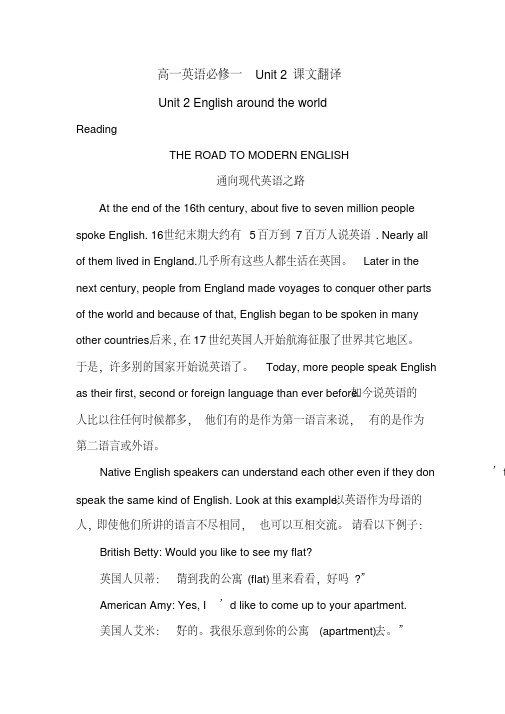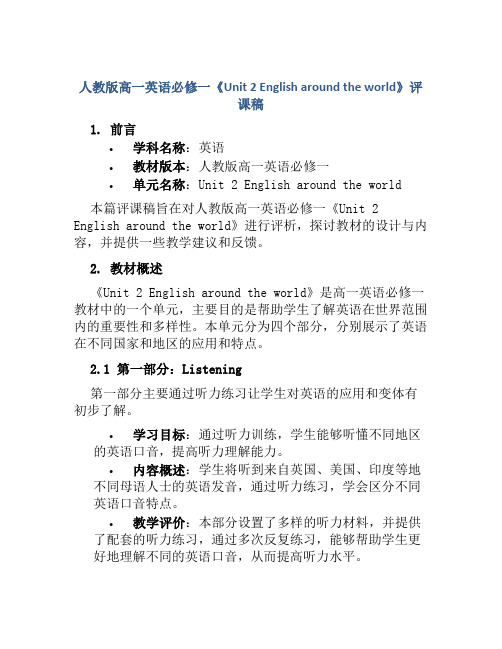英语必修一 Unit 2 English around the world 词汇知识点学案
人教高中英语 必修一 Unit-2-English-around-the-world(共51张PPT)

The seeds come up in spring. 长出来 A few new questions came up at the meeting. 被提出
come up with 意为“提出,
想出”。如:
He came up with a new suggestion.
come across v. 偶遇;无意中发现 come back v.回来;记起;恢复 原状,重新流行
用base的适当形式填空。
1. This book ________ is based on a true story.
2. Mary always ______ bases her ideas on
scientific experiments.
2) present
adj.
当前的, 现在的 (作前置定语)
vt. 赠与, 赠给予, 给, 提出
present sb. with sth.或 present sth. to sb.
把……交给, 颁发, 授予
e.g. Mother presented a gift to me just now.
On his birthday, his friends presented him
with a series of readers /presented a series
of readers to him. (送给他一套读本)
5. Then gradually between about AD 800 and 1150, English became less like German because those who ruled England spoke first Danish and later French. 【翻译】 然后,渐渐地,大约在公元 800年到1150年期间,英语不那么像德 语了,因为那时英国的统治者起初讲丹 麦语后来讲法语。
人教版高中英语必修一Unit2Englisharoundtheworld整个单元课件

15
Reading–III(5m)
Groupwork: Whatcanyoulearnfromthispassage? (discussingroupoffour,thenaskthestudentsto showtheirideas.)
2.Prepareforthenextclass. 3.FinishtheexercisesonWB.
19
20
Period3Learningaboutl anguage
Unit2Englisharoun dtheworld
21
Period3:幻灯片27-48页
Revision(3m)
Match:(Reivewthenewwords)
sIspoketothemjustnow? Helpthestudentsunderstandwhatisaco mmandorarequest.
27
Learningusefulstructure–II(2m)
Makeclearthedifferencebetweencommandsan drequestsandfinishthefollowingexercises:
apartment
autumn
fall
underground(地铁) subway university(大学) college
rubbish(垃圾) garbage
dustbin(垃圾箱) trashcan
holiday
vacation
fortnight(两星期)twoweeks
12
Reading–I(3m)
&
人教版英语必修1Unit 2《English around the world》(Section Ⅰ)ppt课件

Section Ⅰ Warming Up,Pre-reading,Reading & Comprehending
一
二
三
四
五
六
一、写作词汇 预习Reading部分的词汇,完成下列小对话或语篇。 come up with 1.—Who has (提出)such a good idea? —Helen. 2.—The final exam is drawing near. —So every minute should be made use of (利用). 3.—How do you like the film? —Very moving.It is based (以……为根据) on a woman’s life.
词海拾贝
难句剖析
理解诱思
译文: 世界上有许多种英语,它们在词汇、语法、发音和语调方面是不 同的。这些不同种类的英语从历史、地理、政治以及其他语言的 影响发展而来。一些主要的英语种类包括英国英语、美国英语、 加拿大英语、澳大利亚英语、印度英语和加勒比海英语。非洲说 的英语则随着国家的不同而不同,因此,有尼日利亚英语、南非英 语、肯尼亚英语,等等。 所有的英语种类都起源于英国说的英语。现在美国英语已经取 代了英国英语。这主要是因为美国通过电影院、音
一
二
三
四
五
六
4.—Is Mr Wang popular among the students? Actually —Yes,he is. (事实上) he is the most popular teacher. because of 5.It was (因为) my hard work that I passed the At present exams. (目前) I am practising my spoken English so that I can talk with a local (当地人) in England.Besides,I spelling have many things to improve, (例如) my (拼写) and vocabulary (词汇).
高一英语必修一Unit2课文翻译

高一英语必修一Unit 2课文翻译Unit 2 English around the worldReadingTHE ROAD TO MODERN ENGLISH通向现代英语之路At the end of the 16th century, about five to seven million peoplespoke English. 16世纪末期大约有5百万到7百万人说英语. Nearly allof them lived in England.几乎所有这些人都生活在英国。
Later in thenext century, people from England made voyages to conquer other partsof the world and because of that, English began to be spoken in manyother countries.后来,在17世纪英国人开始航海征服了世界其它地区。
于是,许多别的国家开始说英语了。
Today, more people speak Englishas their first, second or foreign language than ever before.如今说英语的人比以往任何时候都多,他们有的是作为第一语言来说,有的是作为第二语言或外语。
Native English speakers can understand each other even if they don’t speak the same kind of English. Look at this example:以英语作为母语的人,即使他们所讲的语言不尽相同,也可以互相交流。
请看以下例子:British Betty: Would you like to see my flat?英国人贝蒂:“请到我的公寓(flat)里来看看,好吗?”American Amy: Yes, I’d like to come up to your apartment.美国人艾米:“好的。
人教版高一英语必修一《Unit 2 English around the world》评课稿

人教版高一英语必修一《Unit 2 English around the world》评课稿1. 前言•学科名称:英语•教材版本:人教版高一英语必修一•单元名称:Unit 2 English around the world 本篇评课稿旨在对人教版高一英语必修一《Unit 2 English around the world》进行评析,探讨教材的设计与内容,并提供一些教学建议和反馈。
2. 教材概述《Unit 2 English around the world》是高一英语必修一教材中的一个单元,主要目的是帮助学生了解英语在世界范围内的重要性和多样性。
本单元分为四个部分,分别展示了英语在不同国家和地区的应用和特点。
2.1 第一部分:Listening第一部分主要通过听力练习让学生对英语的应用和变体有初步了解。
•学习目标:通过听力训练,学生能够听懂不同地区的英语口音,提高听力理解能力。
•内容概述:学生将听到来自英国、美国、印度等地不同母语人士的英语发音,通过听力练习,学会区分不同英语口音特点。
•教学评价:本部分设置了多样的听力材料,并提供了配套的听力练习,通过多次反复练习,能够帮助学生更好地理解不同的英语口音,从而提高听力水平。
•建议与反馈:为了进一步提高学生的听力理解能力,可以增加一些真实英语对话的听力材料,并提供更多的听力练习题,引导学生进行听力训练。
2.2 第二部分:Speaking第二部分通过讲话和对话的练习,提高学生的口语表达能力以及交际能力。
•学习目标:通过课堂练习,学生能够模仿并正确运用英语口音和语调,并能够进行简单的英语对话和交流。
•内容概述:学生将练习模仿英美人士的英语发音,进行有关英语使用的对话练习,如问路、订购食物等场景。
•教学评价:本部分通过组织学生进行角色扮演和小组对话的方式,有效地锻炼了学生的口语表达能力,激发了学生的兴趣和参与度。
•建议与反馈:为了提高学生的口语表达水平,可以增加一些生活化实用的对话练习,如购物、旅行等场景,让学生更好地应用所学知识。
unit2_English_around_the_world教案

unit2_English_around_the_world教案Unit 2 English around the worldPeriod 1Warming Up& Pre-readingTeaching aims: To make Ss to get to know some differences between British English and American English.Important and difficult points: To tell and grasp the differences between British English and American English.Teaching procedures:TO arouse the students’ interest and lead in the topic, the teacher can organize some activities. Step1: T:We have learned something about friendship in unit 1. Do you know what problems they will meet if a British boy wants to make friend with an American boy?Step2. Let Ss discuss how many countries use English as their official language and which countries.(教师可通过PPT的形式,借助以英语为官⽅语⾔的国家国旗和世界地图来辅助完成) And do you know that there is more than one kind of English? Ss may list America, Britain, Canada, Australia……Teacher writes “American English, British English, Canadian English, and Australian English……T: Are the Englishes talked around the world all the same? (先让学⽣⾃由讨论,然后⽼师播放⼀段来⾃不同国家的母语为英语的外国⼈的视频)Step3. Get the Ss to discuss in groups about the differences between American English and British English, and give some examples.a. Can you understand the different kinds of English these people are using?Speaker1: Let’s go to the pictures?Speaker2: Ok. But how shall we go to the movies?Speaker1: Why not go by underground?Speaker2: Er, but the subway station is far away.When you hear two native speakers of English, they may still not speak the same kind of English. Situation discussionJack is a British boy. He went to America for a trip in this summer vacation. The first day he went to a restaurant and looked around for a toilet. When he asked the waitress, she told him it is on the second floor. Jack went up two floors only to find empty rooms.Where is the toilet?BSpeaker1: Can you tell me how to spell the word “neighbor”?Speaker2: N-E-I-G-H-B-O-U-R, neighbour.Summary: Main differencesSpelling, pronunciation and vocabularyPeriod 2Reading and ComprehendingTeaching aims:1、To get students to have a general view about the historical development of English.2、To get students to know different kinds of English around the world, especially the differences between British English and American English.3、To i mprove the students’ reading ability.Important points:1、How to improve the students’ reading ability.2、How to make students enlarge their knowledge on English through reading.Difficult points:1、To be able to get the main idea from the text.2、To be able to use the different reading strategies for different purposes.3、Expressing one’s ideas why one should learn English.Teaching procedures:Step1: Lead-in1. Why should we learn English?Step2SkimmingRead quickly to get the main idea of the text.1. The text mainly tells us ___________.A. that old English is different from the English todayB. how Middle English formedC. English and its historyD. that English will keep changing2. The text is developed mainly by ____.A. placeB. timeC. peopleStep3Scanning【答案】 1.England 2.based 3.German 4.vocabulary5.change /doc/5eed1d4e915f804d2b16c193.html cation9.learners10.identityStep4DiscussionWork in groups. Discuss the following question and then ask two groups to report their answers to the class. 1. Why do you think more people in the world now want to learn Chinese?Period 3 Language pointsTeaching aims: To make Ss to know the meanings of the important words and phrases and master their usages. Important and difficult points:To master the important words and phrases.Teaching procedures:1、the road to modern English常与to连⽤的名词:key, answer, entrance, monument……e. g: the key to the bike, the entrance exam to collegeThere stands a Monument to the People’s Heroes on the hill.2、Do you know that there is more than one kind of English?(P9)你知道英语不⽌⼀种吗?more than的⽤法(1)more than ⽤在数字前,意为“⽐…..多;超过……” 意为“不⽌⼀个”(含义为复数,但谓语动词⽤单数)。
人教新课标高中英语必修一Unit 2 English around the world课件
BritishEnglish
10
BritishEnglish
AmericanEnglish
spelling
pronunciation
colour, favourite, theatre, centre, travelled, metre
color, favorite, theater, center, traveled, meter
2.Prepareforthenextclass. 3.FinishtheexercisesonWB.
19
20
Period3Learningaboutl anguage
Unit2Englisharoun dtheworld
21
Period3:幻灯片27-48页
Revision(3m)
Match:(Reivewthenewwords)
dtous. Themonitortoldusnottoplaygamesintheclassroom. “Willyoupleasenotsmokehere?”sheadded. Sheaskedmenottosmokehere.
29
Learningusefulstructure–IV(10m)
apartment
autumn
fall
underground(地铁) subway university(大学) college
rubbish(垃圾) garbage
dustbin(垃圾箱) trashcan
holiday
vacation
fortnight(两星期)twoweeks
12
Reading–I(3m)
Paragraph2:tellsusnativespeakerscanund erstandeachotherbutnoteverything.
人教版高一英语必修一unit2 English around the world 全单元(共85张) PPT课件 图文
Percentage of English speakers by country
Canada the UK
the USA
India Singapore
of her life.
③The general commanded his soldiers _to__a_t_t_a_c_k
(attack).
(2)改错
He commanded that everyone made the best of the
chance of Senior Three.
make
Words
1.voyage n. 航行;航海
vi.航行;航海
拓展: make/ take a voyage 航行
note
be on a voyage to 正往……航行
go on a voyage
去航行
Practice
语法填空:
1.She escaped her family and shipped on a
3. come up
①A child came up to me and showed me the way to the station走. 近,上来
② The sun comes up in the east. 升起 ③Your question came up at the meeting.
5. base…on/upon…把…建立在…的基础之上 be based on 以…为基础
他把他的电影建立在一个爱情故事之上。 He based his film on a true love story. 他的电影以一个爱情故事为基础。 His film was based on a true love story.
新人教版必修一 Unit 2 English around the world全单元[教案]
Teaching planTeaching aims:1. Get the students to learn different reading skills.2. Get the students to learn about the English language.Teaching important points:1. Develop the students reading ability and let them learn to use some reading strategies such as skimming, scanning, and so on.2.Enable the students to learn about English language and know different kinds of English so as to communicate with people from different countries.Teaching difficult points:Develop the students’ readi ng ability.Teaching methods :Task-based teaching and learningUnit 2English around the world知识目标:本单元需要学习的重点单词为:include role international native elevator flat apartment rubber petrol gas modern culture AD actually present(adj. )rule(v. ) vocabulary usage identity government Singapore Malaysia rapidly phrase candy lorry command request retell polite boss standard Midwestern southern Spanish eastern southeastern northwestern recognize accent lightning direction ma’am subway block本单元需要学习的重点词组为:play a role in because of come up such as play a part(in) 本单元需要学习的重点句型为:1. World English comes from those countries, where English plays an important role as a first or second language, either because of foreign rule or because of its special role as an international language. (the Attributive Clause; either. . . or. . . )2. Native English speakers can understand each other even if they don’t speak the same kind of English. (even if. . . )3. It became less like German, and more like French because those who ruled England at that time spoke French. (those who. . . )4. Today the number of people learning English in China is increasing rapidly. (the number of+ n. 作主语时,谓语动词用单数形式)5. Believe it or not, there is no such a thing as standard English. (Believe it or not, . . . )6. The US is a large country in which many different dialects are spoken. (the Attributive Clause)7. In fact, an English dictionary like the kind you use today wasn’t made until the time of the Qing Dynasty. (the Attributive Clause; not. . . until. . . )8. These men spent nearly all of their lives trying to collect words for their dictionaries. (spend. . . in doing sth. )9. At the age of fourteen, he left his village school in Scotland and taught himself while working ina bank. (while doing. . . )10. We know that languages develop and change over time and that is why we have new dictionaries from time to time. (that is why. . . )本单元需要掌握的交际功能用语为:语言交际困难(Difficulties in language communication) Pardon?I beg your pardon?I don’t understand.Could you say that again please?Sorry, I can’t follow you.Could you repeat that, please?Could you speak more slowly, please?How do you spell it, please?本单元需要掌握的语法为:祈使句及其间接引语(the imperative sentence and its indirect speech)1. 要求或命令(demands or orders)“Open the door, ” told he.→He told/ordered me to open the door.2. 请求(requests)He said, “Please open the door. /Would you please open the door? ”→He asked me to open the door.能力目标:1. 能运用所学语言知识谈论有关“世界英语”方面的话题。
人教版高中英语必修一Unit2_单元教材分析
Unit2 单元教材分析Unit 2 English around the world[单元分析]本单元的中心话题是“世界上的英语(English around the world)”,主要介绍了英语及其发展状况(English language and its development)和各种各样带有民族、地域特色的英语(different kinds of English)等具体内容。
语言知识和语言技能等都是围绕“世界上的英语”(English around the world)这一中心话题展开。
通过对这一话题的探讨,旨在加强学生对英语和当代语言特别是英语发展趋势的了解。
围绕中心话题开展听、说、读、写活动,本单元安排了八个部分:“热身(Warming Up)”“读前(Pre-reading)”“阅读(Reading)”“理解(Comprehending)”“语言学习(Learning about Language)”“语言运用(Using Language)”“小结(Summing Up)”和“学习建议(Learning Tip)”。
“热身(Warming Up)”部分以问答(Do you know that there is more than one kind of English?)和图画的形式,简要介绍了世界上的英语以及英语在某些方面有很大差异,使学生感受到英语的多文化、多层次、多元性,对英国英语和美国英语的不同有一个粗浅的了解,为本单元的进一步学习作好准备。
“读前(Pre-reading)”部分设计的三个步骤都与单元主题有关,因此可以引发学生对课文主题的思考,以便参与课堂活动。
这时可以展开简短的讨论,讨论时要鼓励学生独立思考,阐述不同的看法。
“阅读(Reading)”部分提供了一篇文章,标题是THE ROAD TO MODERN ENGLISH,简要地说明了英语的起源、发展变化、形成原因以及它的发展趋势。
- 1、下载文档前请自行甄别文档内容的完整性,平台不提供额外的编辑、内容补充、找答案等附加服务。
- 2、"仅部分预览"的文档,不可在线预览部分如存在完整性等问题,可反馈申请退款(可完整预览的文档不适用该条件!)。
- 3、如文档侵犯您的权益,请联系客服反馈,我们会尽快为您处理(人工客服工作时间:9:00-18:30)。
Unit 2 English around the world1. more than与数词连用,意为“超过,多于”,相当于over(1) more than one + n 意味“不止一个”,虽语意上为复数,但作主语时,谓语动词用单数形式。
e.g. More than one student is clever.(2) more than + adj./adv./v./分词/从句,意为“不只是,非常,多过……”e.g. It’s more than friendship, but not love.other than 除了rather than 而不是2. be different from 与……不同拓展:be different in sth. 在……方面不同tell the difference between A and B 辨别A与B的不同be the same as 与……相同the same…as 表示同类事物the same…that 表示同一事物the same…who/when/where和……相同的……He went back to the same place ____ he had found the ring.A. whereB. asC. whichD. that3. one another相互,彼此=each othere.g. Tom and Ann looked at each other.注:(1)each other和one another是相互代词,两者都意为“相互,彼此”,在句中作动作或介词的宾语,但不能做主语。
(2)表示两个人或事物之间的相互关系用each other;表示三个或三个以上的人或事物之间的相互关系时,用each other或one another都可以。
(3)each other’s和one another’s后面的名词用复数。
e.g. Dogs biting at each other's tails. 狗咬狗4. nearlynot nearly (=far from)远非;绝不是辨析:nearly 与almostalmost:表示“几乎”“差不多”,常用于下列几种情况:(1)与any, no, none, nothing, nobody, nowhere, never等词连用(2)与too, more than等连用(3)和表示感觉或心理活动的静态动词连用e.g. He said almost nothing was interesting.You could almost imagine that you were in Denmark.nearly:表示“几乎,接近,差不多”,常用于被very, not, pretty修饰时e.g. There is not nearly enough money to buy a new camera.6.because of(1)because与because ofbecause为连词,后接从句because of为介词短语,后接名词、代词或动名词(2)引导原因状语的介词短语:owing to, due to, on account of, as a result of(3)because, why与that引导的表语从句辨析a. because表示一种动作或状态的根本原因。
b. why虽然译成“因为”,但实质上表示结果。
c. that引导的表语从句表示原因,主语通常是reason或what引导的主语从句。
在the reason why…is/was that…结构中,也只能用that引导。
e.g. He loves her because she is pretty.She is pretty. That is why he loves her.The reason why he loves her is that she was pretty.7.even if若主句、从句皆表示将来情况,even if从句可用一般现在时代替将来时。
e.g. We have decided to visit the museum even if it rains tomorrow.辨析:even if与even thougheven if从句的内容不肯定;而even though从句的内容则是事实。
e.g. He will not let out the secret even if he knows it.他是否知道秘密还不确定。
He will not let out the secret even though he knows it.他知道这个秘密。
e up(1)走近;赶上,上来The coming up spring is full of hope.(2)发芽The seedlings are coming up full and green.(3)(尤指意想不到地)发生I will let you know if any change comes up.(4)被提出讨论,被谈到;引起注意The subject of planting came up in the conversation.(5)(太阳、月亮)升起We watched the sun come up.(6)出席,参加,到场We came up for the party.( total eclipse)9.over prep.& adv.(1)prep 相当于during,意为“在……期间”(2)表示时间时,还可表示“一边……,一边……,正在进行……的过程”The girls sang over dancing.(3)超过You are over ten.(4)adv. 完了,结束Class is over.10. base vt. & n.辨析:base与basisbase:表示具体含义,意为“根基、基础、底座”e.g. the base of a buildingbasis:表示抽象含义,即“非物质方面的基础”e.g. the economic basis 经济基础11.present(1)adj. (前置定语)现在的,当前的;(后置定语)出席的,在场的e.g. Did you see the present CEO?Did you see the CEO present?be present at 出席,反义词组为:be absent from缺席(2)n. (C)礼物(3)n. 目前,现在e.g. The boy present at the meeting was considering asking his father for a book on the present tense as a birthday present.12. enrichen-+ adj. /n.---- vt. enable, enclose, encourage, enforce, enlarge, ensure, entitle13. make use oftake advantage of 利用,趁机,占……的便宜make the best of 指(对不利的条件等)充分利用make the most of 指尽量利用有理的条件14.instead ofe.g. They went on foot instead of by bus.instead of的考查主要集中在它连接的平行结构上,即:两个主语,两个宾语,两个状语,两个谓语或两个定语。
instead为副词,通常放在句末,在承接上文时,也可放在句首,意味“代替”。
e.g. We have no coffee, would you have tea instead?15. commandhave (a) good command of….精通command sb. to do sth. 命令某人做某事at one’s command 随心所欲地(的);听从某人吩咐requestby request应邀e.g. He attended the meeting by request.request sth. from sb.He commanded that the students ____ the classroom before he returned.A. didn’t leaveB. wouldn’t leaveC. needn’t leaveD. not leave虚拟语气:一个“坚持”insist(坚持要求)二个“命令”order, command三个“建议”suggest, propose, advise三个“要求”demand, request, require从句用should +do, should可以省略。
suggest作“表明,暗示”讲、insist 作“坚持认为,坚持说”讲时,其后的宾语从句用陈述语气。
e.g. His blush suggested that he liked the girl.The boy insisted that he didn’t like the girl.16. such和so 用法小结(1) such与no, all, most, some, any, another, many, much, a few, few, little, a little, several, one等词连用时,such应置于这些词之后。
(2)so与many, much, few, little等词连用时,so应置于这些词之前。
e.g. There are many such books on sale in the bookstore.There are so many books on sale in the bookstore.17. wayin…way/by…means/with…method18. recognizerecognize that clausesb./sth. + to be…sb. /sth. as…They recognized her to be a super star.= They recognized her as a super star.= They recognized that she was a super star.。
